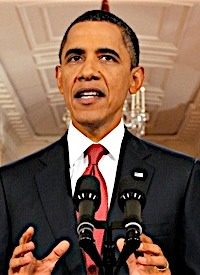
President Obama bemoaned in his July 25 address to the nation that "a significant number of Republicans in Congress are insisting on a different approach — a cuts-only approach." That was a clear reference to the Tea Party movement. And because the U.S. Constitution allows the House to stop any legislation, Obama's only remaining strategy is to appeal to the American people. "So I’m asking you all to make your voice heard. If you want a balanced approach to reducing the deficit, let your member of Congress know. If you believe we can solve this problem through compromise, send that message."
Obama also hinted that Boehner was negotiating with the White House for much higher taxes, but that Boehner eventually backed out of the deal:
While Republicans might like to see deeper cuts and no revenue at all, there are many in the Senate who have said, “Yes, I’m willing to put politics aside and consider this approach because I care about solving the problem.” And to his credit, this is the kind of approach the Republican Speaker of the House, John Boehner, was working on with me over the last several weeks.
It's interesting that House Speaker John Boehner backed out of a tax increase deal after agreeing to it in secret White House negotiations. Did Boehner ultimately back out because he didn't think he could convince enough Republicans to sell out? Did he back out in order to avoid a backlash against his leadership of the House Republicans? Those questions remain unanswered.
Boehner did have the best line of the two press statements. President Obama used the phrase "balanced approach" seven times in his address to the nation to describe his plan to increase taxes, and Boehner explained what Obama meant by "balance":
The President has often said we need a balanced approach, which in Washington means "We spend more and you pay more."
The reality is that neither the White House nor the GOP leadership in Congress has a plan to balance the budget, though both sides claim that's what they want. Boehner noted that "the solution to this crisis is not complicated. If you're spending more money than you are taking in, you need to spend less of it." He added that the President's approach is simple: "the sad truth is that President Obama wanted a blank check six months ago, and he wants a blank check today."
President Obama claimed that his approach would cost middle-class taxpayers nothing. "And keep in mind that under a balanced approach, the 98 percent of Americans who make under $250,000 would see no tax increases at all. None."
But Obama admitted that this wasn't true in the same speech, explaining that the path of accumulating debt on an endless trajectory would hurt the middle class:
Now, every family knows that a little credit card debt is manageable. But if we stay on the current path, our growing debt could cost us jobs and do serious damage to the economy. More of our tax dollars will go toward paying off the interest on our loans. Businesses will be less likely to open up shop and hire workers in a country that can’t balance its books. Interest rates could climb for everyone who borrows money -– the homeowner with a mortgage, the student with a college loan, the corner store that wants to expand.
In fairness, Obama did claim in the same speech that his approach would bring the budget into balance. "Let’s live within our means by making serious, historic cuts in government spending. Let’s cut domestic spending to the lowest level it’s been since Dwight Eisenhower was President. … This balanced approach asks everyone to give a little without requiring anyone to sacrifice too much. It would reduce the deficit by around $4 trillion and put us on a path to pay down our debt."
But the reality is, his own Office of Management and Budget says that Obama's budget proposals — even with $4 trillion of the projected spending increases pared away from his 10-year plan — would still continue to ring up the national credit card forever. In short, Obama's own hirelings admit that Obama's claim that he would balance the budget is a lie. The non-partisan Congressional Budget Office says the same thing.
Boehner claimed Monday that:
In Washington, more spending and more debt is business as usual. Well, I've got news for Washington. Those days are over. President Obama came to Congress in January and requested business as usual, yet another routine increase in the national debt. But we in the House said, "Not so fast." Here was the President asking for the largest debt increase in American history on the heels of the largest spending binge in American history.
Obama may have done the Tea Party a favor by revealing that Boehner is part of the "business as usual" crowd in Washington. The Tea Party movement is starting to hold the line, and has won the day today. But there's still plenty of time for a Washington-style sell-out, an all-too-familiar theme for those who have followed Capitol Hill for any length of time. Obama is trying to rally the nation behind the idea that our budget deficit is not a spending problem, even falsely claiming that spending is the lowest since Eisenhower. Actually, measured in any way, federal spending is at the highest level in American history with the possible exception of World War II.
The open question remains: How will the American people and the Tea Party movement respond to Obama's false rallying cry?
Photo of President Obama addressing nation on debt-limit debate: AP Images



